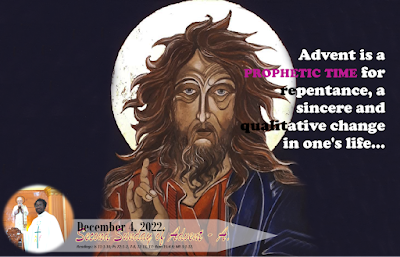ON THE DANGER OF FANATICISM.
September 26, 2021
Twenty-sixth Sunday in Ordinary Time – B.
An Albanian proverb says: “If a man is right, he cannot be
too radical; if wrong, he cannot be too conservative.” And a French proverb
adds: “Too much zeal spoils everything.”
In religious as well as in social or political life, some
people think detaining the whole truth. They think to have an exclusive right
on everything. These one run the danger of fanaticism.
I tried to look for a quite fitting definition to
fanaticism, and here is what I found: "Fanaticism (from the Latin adverb
fānāticē [fānāticus; enthusiastic, ecstatic; raging, fanatical, furious]) is a
belief or behavior involving uncritical zeal or an obsessive enthusiasm. The
philosopher George Santayana defines fanaticism as "redoubling your effort
when you have forgotten your aim". Every religious belief has its fanatic
members, and some of them easily fall into radicalism leading to terrorize all
who do not share their vision of things. Just as we speak of fanatism in Islam,
so too, there is fanatism in Christianism and even in Catholicism.
The liturgy, today, tells us where fanaticism or extreme and
uncontrol enthusiasm and zeal can lead man. It appears clearly that extremism
is begotten in jealousy. In the book of Numbers, we read that Joshua, son of
Nun asks Moses to stop Eldad and Medad from prophesying because not being among
those who were designated to receive the Spirit God took from Moses to bestow
on the selected elders. The answer of Moses to the zealous Joshua, teaches us
about this reality of fanaticism: "Are you jealous for my sake? Would that
all the people of the Lord were prophets! Would that the Lord might bestow his
spirit on them all!"
Fanaticism, as we said, finds its origin in jealousy. We
cannot accept that others who do not belong to our groupuscule could savor the same
privileges as we do. We will like to prevent them from doing so. And with that
mindset, we open the gate to social, political, or religious violence. So,
fanatic people double their jealousy with extremism and violence.
In the Gospel, we are faced with another expression of zeal.
John, the intransigent and tempestuous Apostle reports to Jesus that they have
seen a man performing miracles and wonders in the Lord's name. The problem is
that the man was not a member of their cohort, he does not belong to the group.
How can someone who does not belong to the group have the same prerogatives as
those who belong to Jesus' closest friends? The modules of fanaticism are
always the same. Just as it was with Joshua regarding Moses’ spirit, so too it
is with John concerning preaching and healing in Jesus’ name. “They are not
with us, so, they cannot do like us.” But Jesus raises a beautiful moral and
social principle that can end all kinds of fanatic mentality. He said to the
disciples: “Do not prevent him. There is no one who performs a mighty deed in
my name who can at the same time speak ill of me. For whoever is not against us
is for us.”
When people are caught in the trap of fanaticism, they lose
sight of the basis, truth, and love, fundamental elements of genuine
discipleship. It calls for a clear judgment and a great sense of discernment to
not raise war against others because they do not belong to the same group where
we belong. Everyone cannot be of the same group. It is not a matter of
party-list or cohort. We are not enemies simply because we do not share the
same belongingness. Our differences can be riches. All we must do is to avoid
the jealousy that leads to plot all kinds of evils against those who are not
with us. We should not be an obstacle for others. And Jesus ends by giving some
pieces of advice on social life and on being together. It is all about, how to
live in harmony with others and not depriving them of their rights.
In the second reading, the Apostle James provides more
advices and stern warnings. He directly addresses the rich and warns them: the
Lord hears the cry of those you have cheated. Therefore, "start crying,
weep for the miseries that are coming to you..." Some people have built
their confidence in material possessions only. All that matters for them is
what they possess. And for that, they can even deprive the poor one of the
little they have and abuse their rights. James warns them, “Your wealth has
rotted away, your clothes have become moth-eaten, your gold and silver have
corroded, and that corrosion will be a testimony against you; it will devour
your flesh like a fire.” Riches are good, but if material possession and
accumulation are all that matters for you and blinds you in a human relationship,
you are worse than you think. For fanaticism (extremism) and the danger of
material possession are two great poisons to human life.





Comments
Post a Comment